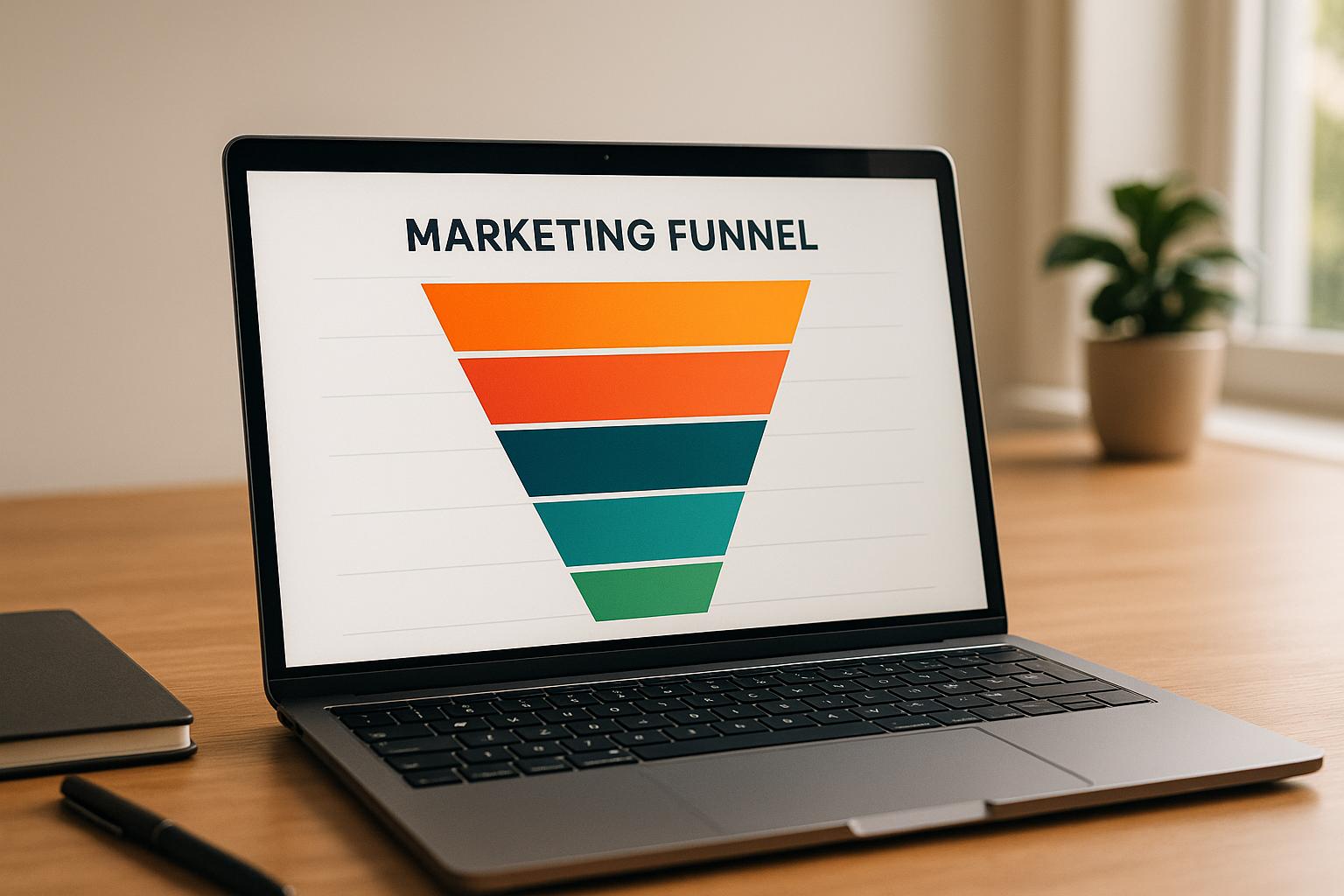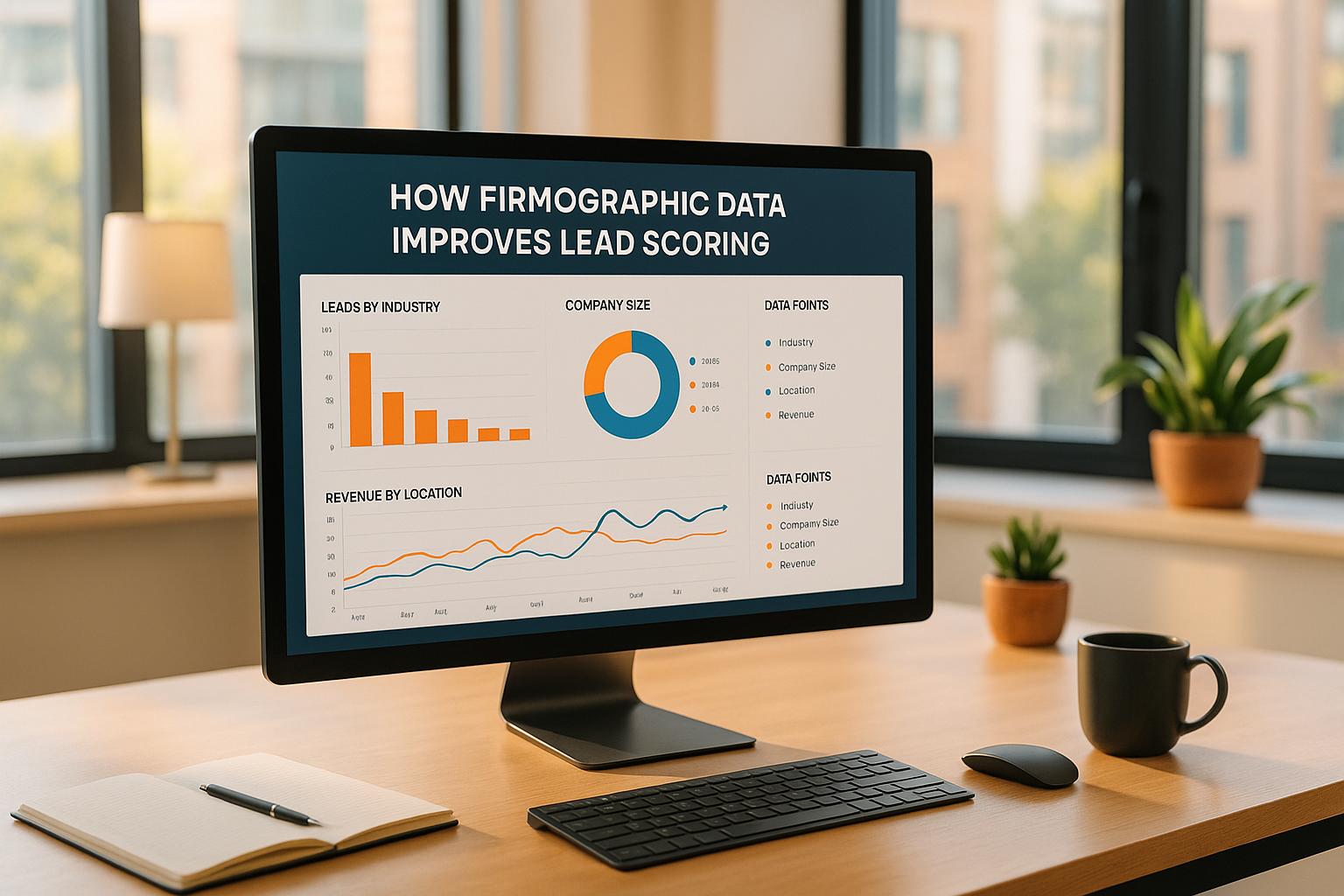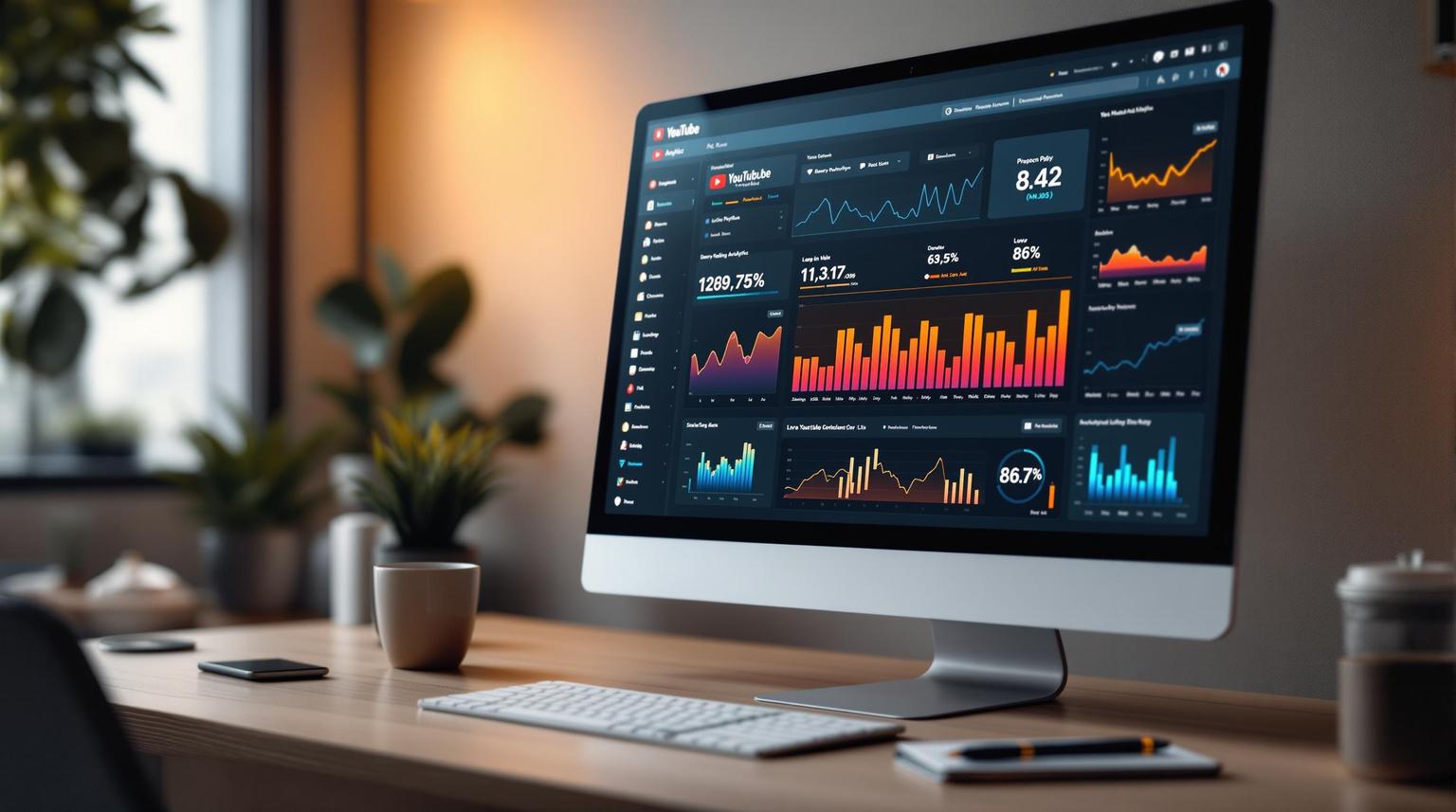Want to turn more website visitors into loyal customers? Here are 12 proven marketing funnel tools that small businesses actually use to grow:
- HubSpot - All-in-one marketing platform with free CRM
- Semrush - SEO and keyword research powerhouse
- Canva - Easy visual content creation
- MailChimp - Email marketing with 87.88% inbox delivery rate
- Hotjar - Website behavior tracking and heatmaps
- Unbounce - Landing page builder with AI optimization
- ClickFunnels - Complete sales funnel builder
- Kajabi - Digital product and course selling platform
- Systeme.io - Budget-friendly all-in-one marketing tool
- Zendesk - Customer service and support automation
- ActiveCampaign - Email marketing and CRM automation
- LoyaltyLion - Customer loyalty program platform
Here's the reality: Most websites only convert 1-2% of visitors. But businesses using these tools see much better results:
- 34% higher revenue
- 53% better conversion rates
- 5x cheaper to keep existing customers vs finding new ones
Quick Comparison of Popular Options:
| Tool | Starting Price | Best For |
|---|---|---|
| HubSpot | Free CRM | Complete marketing automation |
| Systeme.io | Free | Budget-conscious startups |
| ClickFunnels | $97/mo | Sales funnel focus |
| Kajabi | $149/mo | Digital product creators |
Pick tools based on your immediate needs and budget - most small businesses spend 13-15% of revenue on marketing. Start with free trials, then upgrade as you grow.
Related video from YouTube
What Are Marketing Funnel Tools?
Marketing funnel tools are digital powerhouses that guide potential customers from brand discovery to loyal patronage. They're like a 24/7 sales team, automating the customer journey through four key stages: awareness, consideration, conversion, and loyalty.
These tools aren't just a nice-to-have anymore. HubSpot reports that 76% of businesses use at least one marketing automation tool. Why? Because they work.
Companies using these tools see some serious results:
- 34% boost in revenue (on average)
- 53% higher conversion rates
That's the power of having insights at every customer touchpoint.
"A marketing funnel can help you reach your goals more efficiently. It enables you to create highly tailored campaigns that improve customer acquisition and retention, boost conversion rates and lead to greater efficiency." - Alex Quin, CMO of UADV
So, what makes these tools tick? Here's a quick breakdown:
| Feature | What It Does |
|---|---|
| Lead Generation | Grabs and organizes potential customer info |
| Automation | Sends targeted content based on customer behavior |
| Analytics | Tracks user actions and spots drop-off points |
| Integration | Plays nice with your existing systems |
Let's look at a real-world example. Community First Fund transformed their operations with marketing automation tools. John Scott, their VP of Community Lending, said:
"Before Dynamics 365 CRM, we were dependent on using Word documents, Excel spreadsheets, shared folders, and Outlook to record and share interactions. Not all information was conveniently available to everyone when they needed it."
But here's the kicker: the best tools don't stop at the purchase. They create a "flywheel" model, where happy customers drive word-of-mouth marketing and repeat business. This matters because it costs five times more to snag a new customer than to keep an existing one.
When you make buying easy, customers are 62% more likely to make high-quality purchases. That's why top-notch funnel tools focus on smooth experiences across all touchpoints - from social media to email to landing pages.
In short, marketing funnel tools are your digital Swiss Army knife for guiding customers, boosting sales, and keeping your business growing.
How to Choose the Right Tools
Picking marketing funnel tools can be tough. But if you focus on what matters, it gets easier. Let's break it down.
First, look at what you need now and what you'll need later. Simantel puts it well:
"Finding the right marketing automation software can feel like a mind-boggling task, but having a firm handle on your business needs and marketing goals is a good place to start."
Think about what you need right now and what you might need in 5 years.
Here's a simple way to compare tools:
| What to Look At | Questions to Ask |
|---|---|
| Main Features | Does it have landing pages, email automation, lead scoring, SEO tools? |
| Works with Other Tools | Does it connect with your CRM, social media, and other tech? |
| Easy to Use | Is there a drag-and-drop editor? Templates? Is it hard to set up? |
| Help When You Need It | Is there 24/7 support? Help with setup? Training? |
| Room to Grow | Are there user limits? Feature limits? Can it grow with you? |
Don't forget about price. Look at more than just the monthly cost. Some tools charge extra for key features. For example:
- ClickFunnels: $97/month for basics, $297/month for advanced stuff
- Leadpages: $37/month for simpler funnels
The OMR Guide says:
"If you follow these six tips, nothing should stand in the way of your successful marketing automation strategy."
Try before you buy. Use free trials and demos. The best tool is one your team will actually use. Think about:
- How hard is it to learn?
- Is there good help available?
- Are there tutorials and guides?
Look at the data you'll get. Can you:
- Run A/B tests?
- Track conversions?
- Get detailed reports?
This info helps you make smart choices about your marketing.
Don't forget about security and storage. As you grow, you'll need a tool that can handle more data and keep it safe.
Make a list of "must-haves" and "nice-to-haves." This helps you avoid paying for fancy features you won't use. Check your list every year to make sure your tools still fit your needs.
1. HubSpot

HubSpot is a powerhouse for small businesses looking to supercharge their marketing funnel. It's like a Swiss Army knife for marketing - you get CRM, marketing automation, and sales tools all in one package.
The best part? You can start small and grow big. Their free CRM handles up to 1,000,000 contacts. That's right, FREE. As your business grows, you can add more features without breaking the bank.
What sets HubSpot apart is how everything works together. Want to build a landing page? There's a drag-and-drop tool for that. Need to send emails? Got it. Managing social media? Yep, that too. And the kicker? You can track your customer's journey from the first click to the final sale.
Here's what Jay Owen, CEO of Business Builders, has to say:
"HubSpot CRM for small business is the tool you need if you find yourself juggling customer interactions, managing the sales cycle, and handling both marketing automation and customer service."
Let's break down why HubSpot rocks for marketing funnels:
| Feature | What's in it for you? |
|---|---|
| Marketing Automation | Set up email sequences that trigger based on what your leads do |
| Content Management | Create and optimize your marketing content right in the platform |
| Lead Generation | Catch leads with forms, pop-ups, and live chat |
| Analytics | Start with 30 free reports, scale up to 750 if you need more |
| Social Media | Manage all your social profiles from one dashboard |
But does it actually work? You bet. Businesses using HubSpot's inbound marketing tools see a 14.6% close rate on SEO-generated leads. Compare that to the measly 1.7% for traditional outbound methods. That's not just an improvement - it's a game-changer.
Worried about cost? Don't be. The Starter plan kicks off at $96/month, giving you 5,000 contacts and 25,000 email sends. It's perfect for businesses ready to grow.
Got a longer sales cycle? HubSpot's got you covered. You can set up smart workflows that move leads through your funnel automatically based on how they interact with your content and website.
And here's a bonus: HubSpot offers free certification courses and resources. It's like having a marketing guru on speed dial, helping you squeeze every drop of value from the platform without spending a fortune on training.
In short, HubSpot isn't just a tool - it's your marketing funnel's new best friend.
2. Semrush
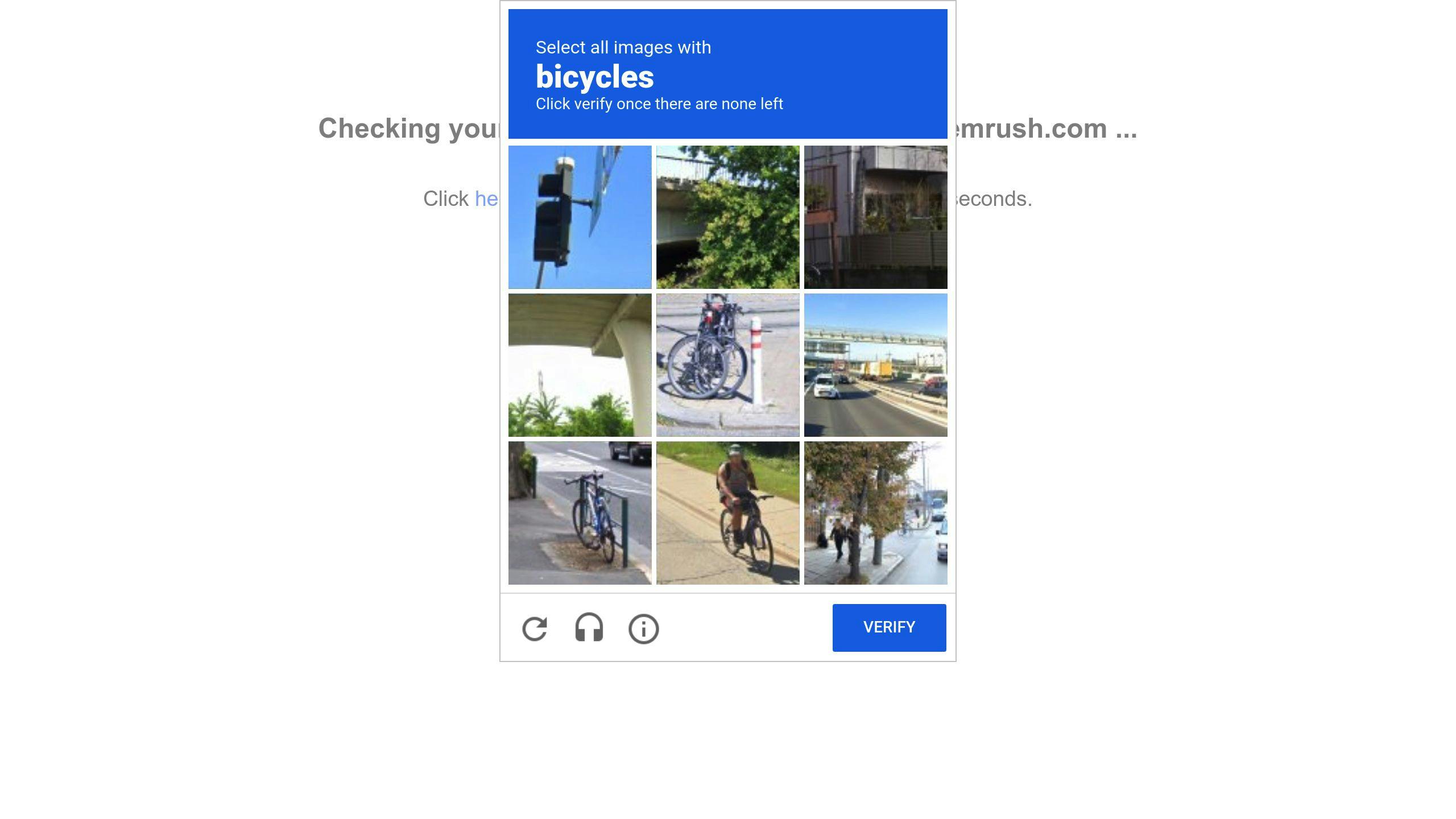
Semrush is your search marketing powerhouse. While HubSpot covers the whole marketing spectrum, Semrush zeroes in on getting you found online.
The star of the show? The Keyword Magic Tool. It's like peeking into your customers' minds to see what they're searching for. Small businesses can't get enough of it - 66.2% of Semrush reviews come from SMBs.
Lucas Widdes, a Marketing Consultant, puts it this way:
"The Semrush Keyword Magic Tool is an invaluable resource for small businesses looking to grow their online presence."
Semrush packs a punch in three key areas:
- Keyword Research: Uncover hidden search gems your competitors missed.
- Site Audit: Spot and fix SEO issues holding you back.
- Competitor Analysis: Keep tabs on up to 5 rivals and learn from their moves.
On a tight budget? Semrush's free plan lets you track 10 keywords daily, audit 100 pages monthly, and manage 5 social profiles. It's a great way to test the waters.
Sam, who runs a small digital marketing company, shares:
"Before we started using Semrush, we used Hike SEO. It was perfect for us at the time as we were quite new to SEO services, but we moved past our area of expertise and we outgrew this initial platform that we're using."
Want to boost your content game? Semrush data shows top Google results average 1,447 words. Use their Topic Research tool to craft content that hits this sweet spot.
The ImpactHero tool tracks three key metrics:
- Reach (traffic)
- Nurturing (active visitors)
- Leads (form submissions)
This helps you pinpoint where your funnel needs work.
For businesses aiming to grow online, Semrush is a must-have. It takes complex SEO tasks and turns them into actionable insights that boost your bottom line.
3. Canva

Visual content packs a punch in marketing. Our brains gobble up images 60,000 times faster than text and hang onto 80% of visuals, compared to a measly 20% of text. Enter Canva: the design tool that's changing the game for small businesses.
Canva's got a treasure trove of goodies:
| Feature | Free Plan | Pro Plan ($15/month) |
|---|---|---|
| Templates | 2.1M+ | 3.8M+ |
| Media Assets | 3.2M+ | 127M+ |
| Brand Kits | 1 | 1,000 |
| Storage | 5GB | 1TB |
But here's where Canva really shines for your marketing funnel:
- Social media boost: Canva-designed posts are engagement magnets. Facebook posts see 53% more likes and 104% more comments. Tweets? They get 150% more retweets when they've got images.
- Brand consistency: Pro users can whip up to 1,000 brand kits. Colors, fonts, logos - all ready to go. Your lead magnets, social posts, and sales materials? They'll look slick and build trust.
- Funnel visualization: Canva's got 533 funnel templates. Perfect for mapping out your customer's journey.
- Team collaboration: Work together, access designs anywhere. Cloud storage for the win.
Carleigh, an ad expert, puts it simply:
"One of the main reasons I love Canva is because it is so easy to use for people who aren't professional designers."
And SmartBug Media? They're fans too:
"Simply put, it's a great tool for the marketing professional that wants to up their digital marketing game, increase their chances of successfully capturing leads, and deliver sales."
Start with the free version. It's loaded with enough features to create eye-catching marketing materials. Ready to level up? The Pro version unlocks tools like background removal and Magic Switch - perfect for crafting slick funnel content.
4. MailChimp

MailChimp is a big deal in email marketing. They send out over a billion emails every day for 15 million users. And get this: 87.88% of those emails actually make it to inboxes.
Here's what MailChimp offers:
| Plan | Price | What You Get |
|---|---|---|
| Free | $0 | 2,000 contacts, 12,000 emails/month |
| Essentials | $9.99/month | Automation, A/B testing |
| Standard | $14.99/month | Better analytics, retargeting |
| Premium | $299/month | Advanced segmentation, multivariate testing |
MailChimp is all about making your customer journey smooth. They've got 700+ templates and smart tools to group your contacts. For example, if you sell stuff online, MailChimp can automatically remind people about items they left in their cart. If you're running a SaaS business, it can nudge inactive users to try out features they're missing.
One of MailChimp's strong points is setting up welcome emails. You can offer freebies up to 10MB and kick off a series of emails to nurture your leads. Inka Wibowo, a senior content manager, says:
"MailChimp is definitely easier to master."
The folks at Floowi think it's pretty comprehensive:
"MailChimp brings together email, landing pages, marketing automation, and analytics in one cost-effective platform."
If you're a small business looking to grow, MailChimp's drag-and-drop editor makes creating eye-catching campaigns a breeze. The free plan is great for getting started. As you grow, MailChimp grows with you, offering fancy features like testing multiple versions of your emails and slicing and dicing your audience in smart ways.
MailChimp plays nice with popular CRM systems like Salesforce and HubSpot. This means your marketing efforts stay in sync with the rest of your business. Plus, with its built-in analytics, you can see what's working and what's not at every step of your funnel.
5. Hotjar
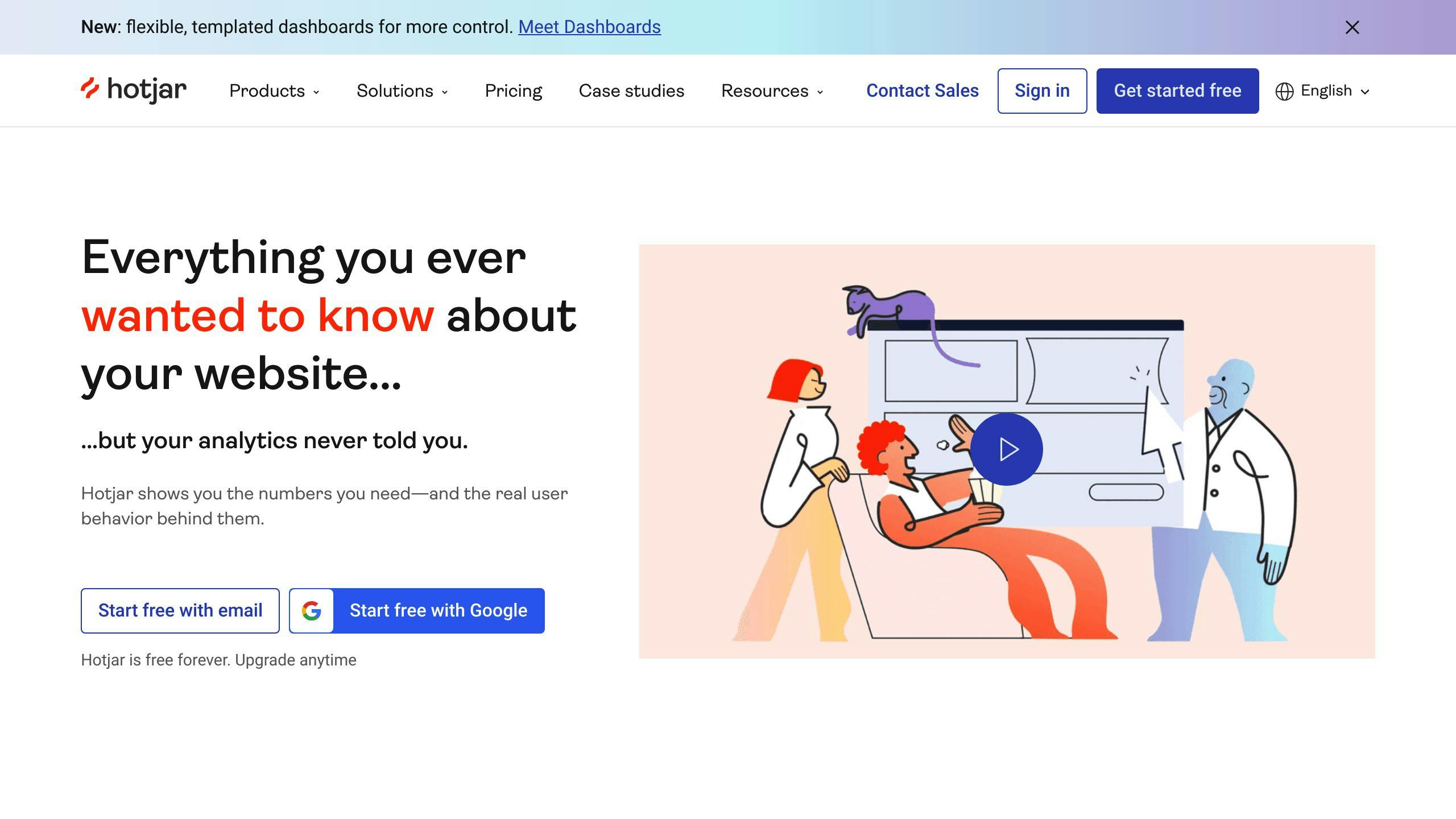
Hotjar takes website analytics up a notch. It shows you exactly how visitors interact with your site. While Google Analytics tells you what's happening, Hotjar reveals why.
Hotjar offers three main features:
- Heatmaps: See where users click and how far they scroll
- Session Recordings: Watch real user journeys on your site
- Feedback Tools: Get direct input from users
These tools help you spot issues in your marketing funnel and fix them fast.
Setting up Hotjar is quick - most users get it running in under 10 minutes. They offer a free plan for small sites, with paid plans starting at $32 per month.
Real businesses are seeing results. At Spotahome, Sara Parcero-Leites uses heatmaps in team meetings to find UX improvements. Techsmith's UX team found that users preferred clicking product images over text buttons, leading to a smart redesign.
"If you're doing business online and want to understand user behavior to make smarter decisions and build online experiences that drive results, you need a platform that provides holistic insights to help you understand what your users do and why." - Hotjar Team
Here's a real-world example: One company's scroll map showed that 80% of visitors weren't reaching the bottom of their webpage. They moved testimonials up, and boom - 75% of visitors saw them, and 69% made it to the page bottom.
Hotjar plays nice with other tools like Google Analytics, Mixpanel, and HubSpot. For small businesses looking to grow, Hotjar's visual insights make it easier to spot ways to improve your marketing funnel and boost conversions.
sbb-itb-a84ebc4
6. Unbounce
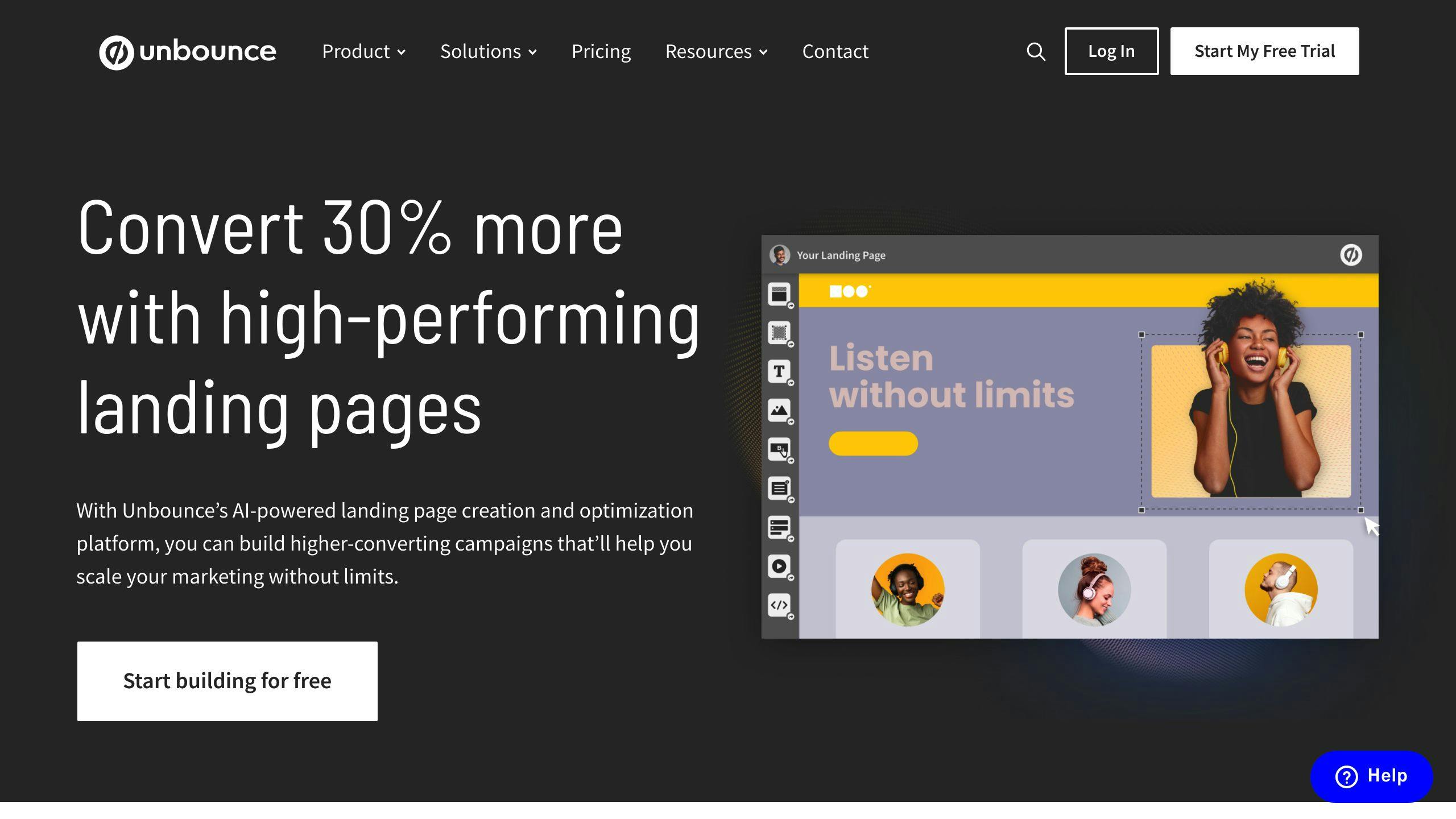
Unbounce is a landing page builder that helps small businesses turn website visitors into customers. It's easy to use, even if you don't know how to code.
What makes Unbounce special? Its Smart Traffic™ AI. This tech automatically sends visitors to the best landing page for them. And it works - businesses see 30% more conversions compared to old-school A/B testing.
Here's what Unbounce offers small businesses:
1. AI That Optimizes
Smart Traffic watches how visitors act in real-time. Then it sends them to the page most likely to convert them. No more waiting around for A/B test results.
2. Text That Changes
Unbounce can change page content based on what visitors searched for. This makes pages more relevant, which means more conversions.
3. Templates That Convert
There are over 100 ready-to-use templates. They're made for different goals and industries, with things like smart CTAs and well-placed forms to boost conversions.
| Plan | Monthly Price | What You Get |
|---|---|---|
| Build | $99 | Landing pages, popups, AI writing help |
| Experiment | $149 | 30,000 visitors, A/B testing |
| Optimize | $249 | 50,000 visitors, AI optimization |
"Unbounce isn't an all-perfect tool - and it's pricier than many other landing page solutions - but it packs a lot of useful features to make it very worth your while."
Want better results? Connect Unbounce to your email marketing tools. This lets you send instant follow-ups when someone converts. Unbounce works well with most marketing tools, either directly or through Zapier.
7. ClickFunnels
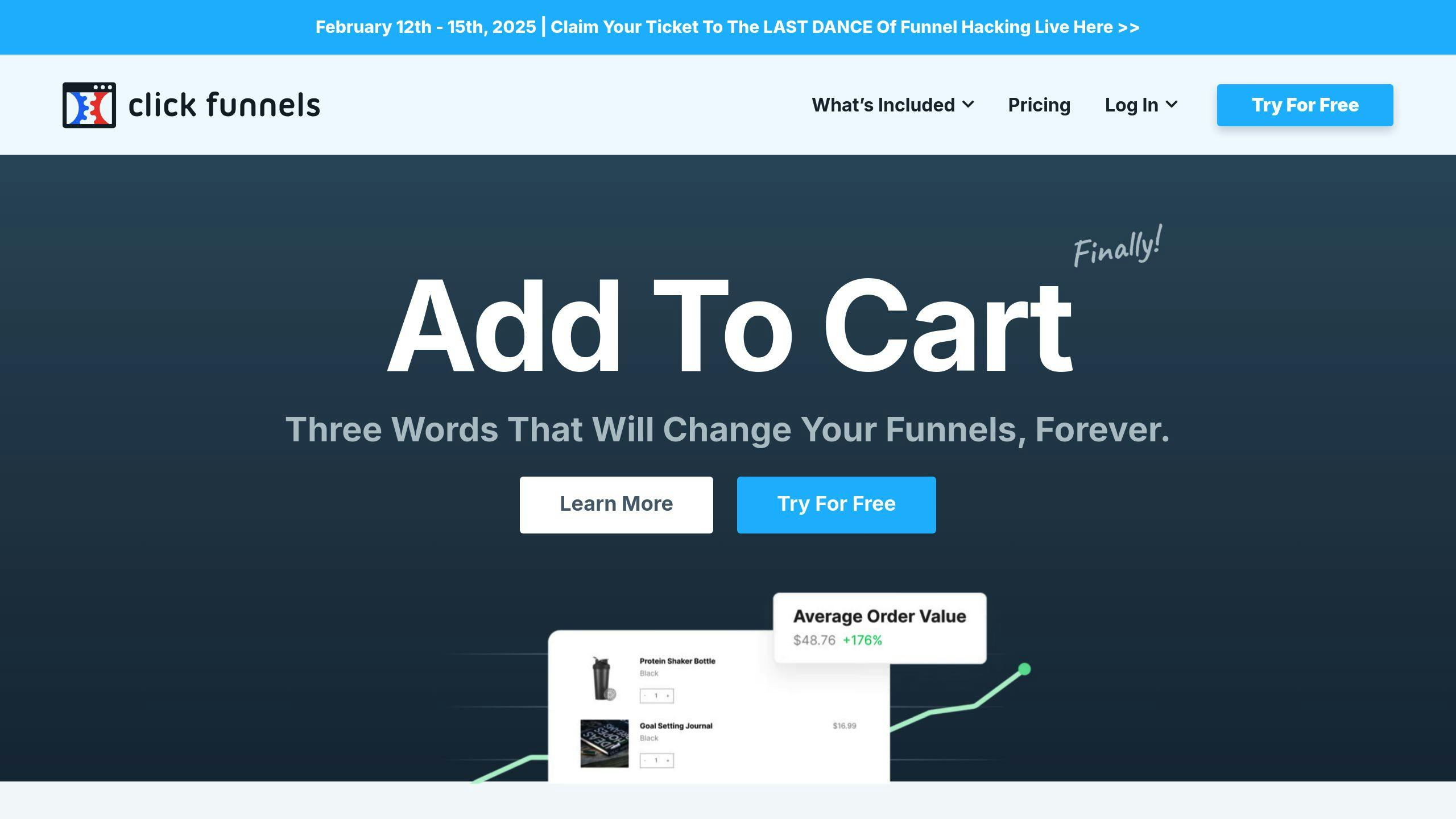
ClickFunnels is a sales funnel builder that turns website visitors into customers. Russell Brunson launched it in 2014, and now over 100,000 people use it.
Here's why ClickFunnels is a big deal:
- It's an all-in-one tool. You get landing pages, email marketing, and payment processing in one place.
- It's easy to use. The drag-and-drop editor means you don't need to be a tech whiz to build funnels.
- It has ready-made templates. These are organized by industry and goal, so you can find one that fits your needs.
Let's look at the pricing:
| Plan | Monthly Price | What You Get |
|---|---|---|
| Starter | $97 | 20 funnels, 100 pages, 3 domains |
| Platinum | $297 | Unlimited funnels, 9 domains, email marketing |
| TwoCommaClub | $2,497 | VIP support, 27 domains, unlimited everything |
People who use ClickFunnels seem to like it. One user said:
"Creating funnels in ClickFunnels is simple with the drag and drop editor. I don't need any technical skills to customize and optimize my pages."
But does it actually work? Well, some businesses have seen big results:
- A skincare entrepreneur made $30,000 in three weeks launching her product line.
- Another business owner made $130,000 in six weeks selling soap and lotion.
ClickFunnels also makes it easy to get paid. It connects with Stripe and other payment processors, so you can collect money without extra tools. Plus, it has a built-in CRM to keep track of your customers.
Is it worth the price? The Starter plan at $97/month gives you 20 sales funnels and 100 landing pages. It's not the cheapest option out there, but for businesses serious about online sales, it might be worth the investment.
8. Kajabi
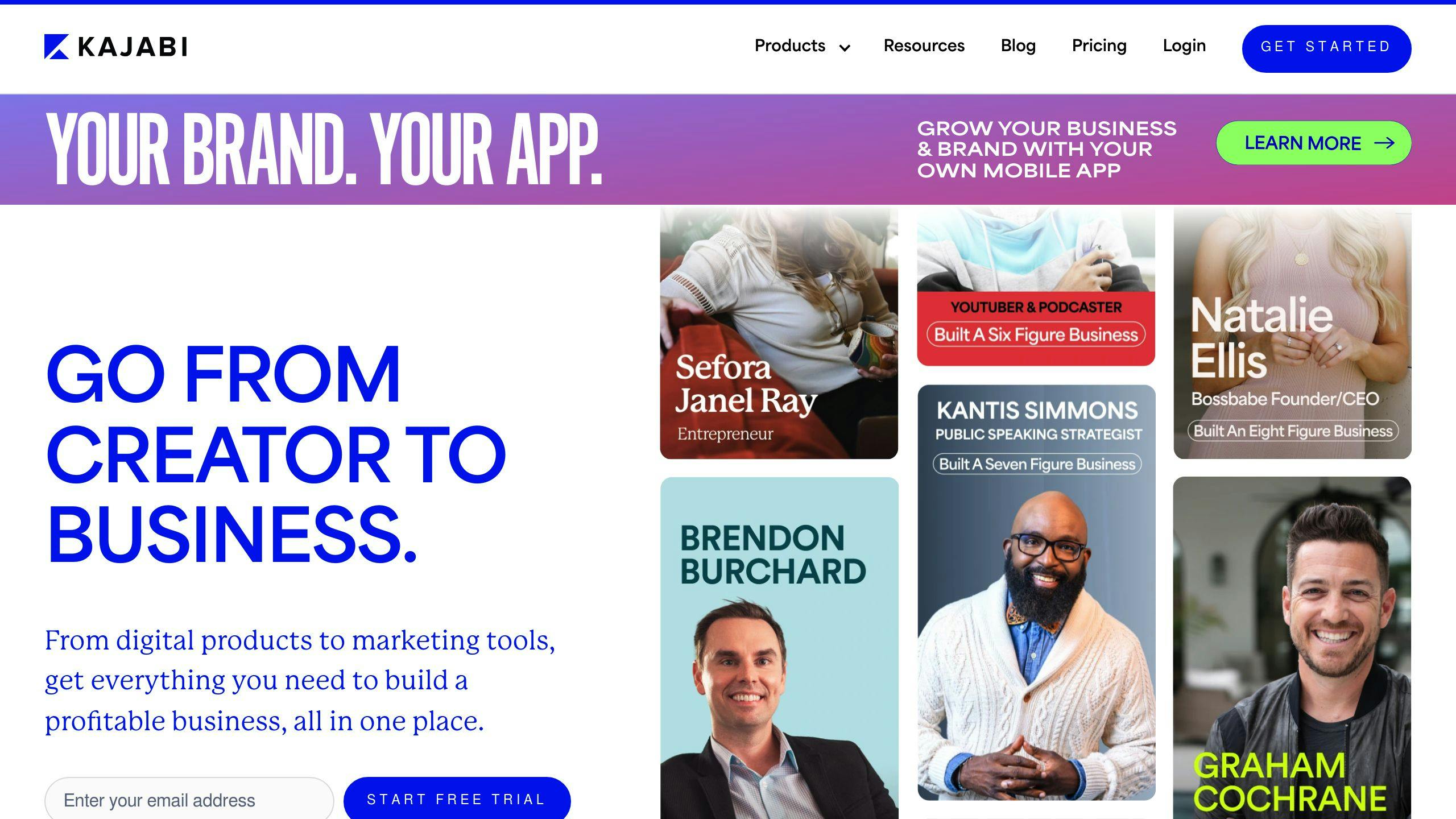
Kajabi isn't your average funnel tool. It's a one-stop shop for entrepreneurs selling digital products and online courses. Think course creation, membership sites, and marketing automation all rolled into one.
Their funnel builder, Kajabi Pipelines, comes with two main templates:
- OVO (Opt-in, Value, Offer)
- Legacy
These pre-built funnels help you create everything from lead magnets to full product launches without getting lost in tech details.
Here's what you'll pay:
| Plan | Monthly Cost | What You Get |
|---|---|---|
| Basic | $149 | 3 funnels, 3 products, 1 website |
| Growth | $199 | 15 funnels, unlimited products |
| Pro | $399 | 100 funnels, advanced automation |
What sets Kajabi apart? Its built-in course delivery system. Create, market, and sell digital products all in one place. No need to juggle multiple platforms. You get email marketing tools, customizable landing pages, and automated delivery systems baked right in.
One digital product creator put it this way:
"I'd rather pay more per month for a software platform that puts a strong emphasis on user designed experience than having a cheaper option that makes moving through my course content feel like trudging through the mud as a consumer."
Kajabi's automation system is a game-changer. It handles:
- Adding or removing customer tags
- Granting product access
- Triggering email sequences
- Managing membership levels
Plus, it plays nice with Google Analytics and Facebook Pixel, so you can keep tabs on your marketing efforts. And if you hit a snag? Their 24/7 customer support has your back.
Now, $149/month might make you pause. But for small businesses focused on digital products, Kajabi's all-in-one approach can actually save you money. How? By eliminating the need for separate subscriptions to course platforms, email marketing tools, and website builders.
9. Systeme.io

Want a marketing funnel tool that won't break the bank? Check out Systeme.io. It's like a Swiss Army knife for digital marketing, packing all the essentials into one affordable package.
Aurelian Amacker launched Systeme.io in 2016 with a simple goal: give marketers everything they need without the hefty price tag. You get a drag-and-drop funnel builder, email tools, automation, and even course creation - no tech wizardry required.
Here's what you'll pay:
| Plan | Monthly Cost | What You Get |
|---|---|---|
| Free Forever | $0 | Basic features with limits |
| Startup | $27 | 5000 contacts, 10 funnels, 5 courses |
| Enterprise | $97 | Almost everything unlimited |
Why choose Systeme.io? It's WAY cheaper than the competition. Users save about $3,200 a year compared to ClickFunnels. Plus, you get the whole package - from blogging to managing affiliate programs.
Automation is where Systeme.io really shines. You can:
- Send emails to cart abandoners
- Trigger actions based on what users do
- Manage contact lists on autopilot
- Handle payments through PayPal and Stripe
"If you are starting out your digital marketing business, and need an all-in-one platform that will allow you to build funnels, send emails, and sell products without spending a fortune then you should 100% give Systeme.io a shot." - Author Name, Author's Title or Notable Role.
Just dipping your toes into digital marketing? The free forever plan lets you test the waters without risk. And don't worry about a steep learning curve - you can start building funnels and launching campaigns in hours, not days.
Sure, Systeme.io might not have ALL the bells and whistles of pricier options. But for entrepreneurs who need a straightforward, budget-friendly way to manage their marketing funnels, it's hard to beat.
10. Zendesk
Want to turn customer service into a growth engine? Zendesk might be your answer. This cloud-based platform takes ticket management to the next level, boosting your marketing funnel through top-notch customer experience.
Zendesk's superpower? Its laser focus on customer experience (CX). The platform combines AI-powered bots, real-time tracking, and smart workforce management in one system. No more tool-juggling or losing leads between touchpoints.
Check out these real-world results:
| Improvement Area | Impact After Zendesk |
|---|---|
| First Response Time | 42% faster |
| Handle Time | 27% quicker |
| Admin Productivity | 15% boost |
| Customer Satisfaction | 5% increase |
Pricing starts at $19/month for basics, scaling up to $115 per agent monthly for the full suite. Sounds pricey? The ROI tells a different story. Take Smiles, a travel loyalty program. After using Zendesk for Facebook Messenger support, their customer interactions shot up from 100 to 1,000 monthly contacts. Even better? 50% became repeat customers.
"Companies choose Zendesk because we know what you need to deliver best-in-class CX at scale while keeping costs low." - Zendesk Representative
Zendesk excels in lead management automation, keeping your funnel stages clear. Its sales dashboard gives you real-time business health updates, while the funnel report shows how leads turn into deals. For small businesses, this means every lead gets attention.
Fabrice Dowling, global head of customer care at HeliosX, says it best: "The way we could just create flows and automations was so much easier... I wanted to get the system up and running quickly, and Zendesk was the better tool for being able to make changes at speed."
Here's a wake-up call: Zendesk's research shows 50% of customers bail after one bad experience. That jumps to 80% after multiple letdowns. But with Zendesk's customizable dashboards, smart workforce management, and built-in CX know-how, you can keep those customers coming back for more.
11. ActiveCampaign
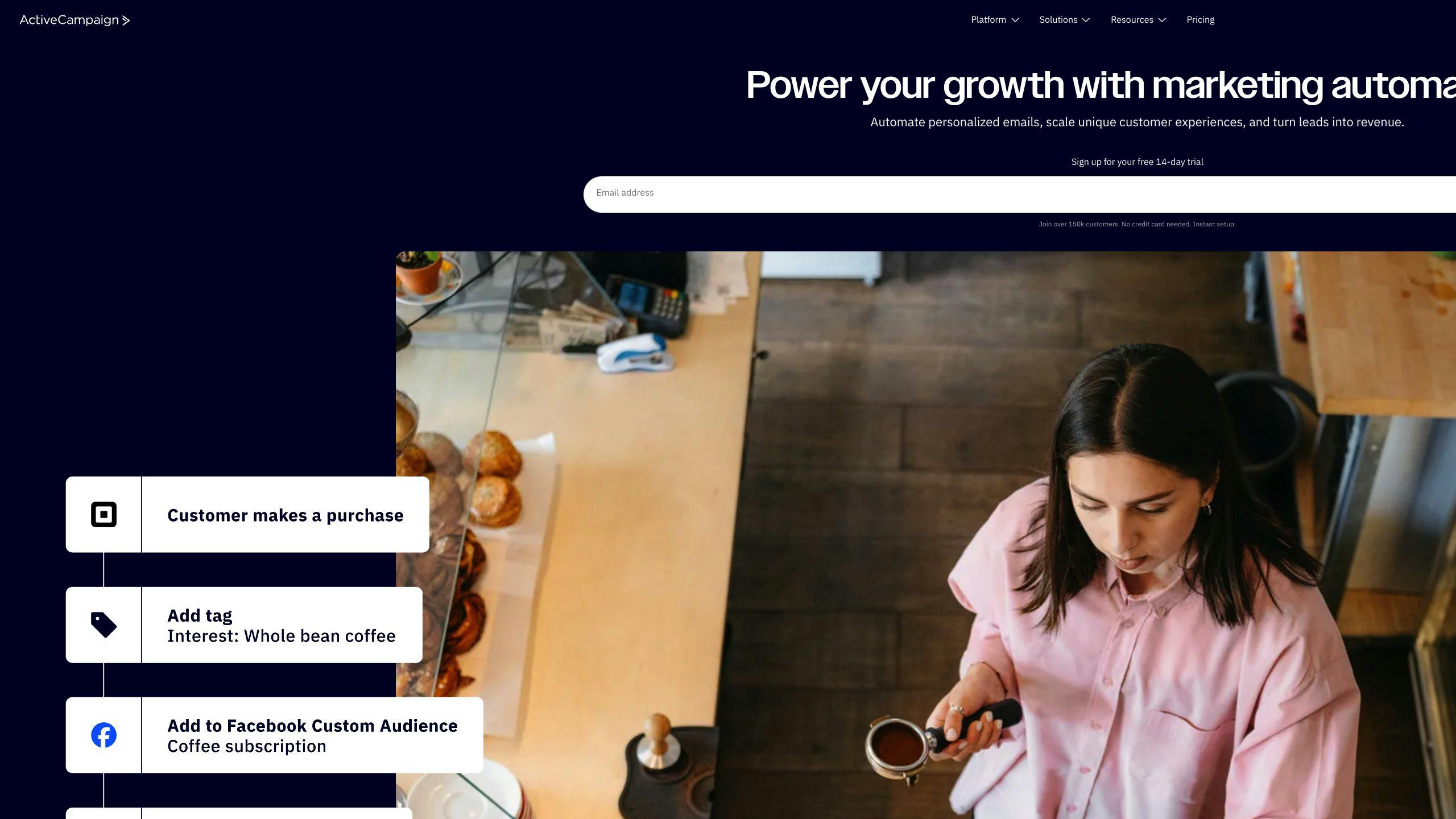
Want to supercharge your email marketing? ActiveCampaign might be your answer. It's not just email - it's a full-blown CRM with automation that works while you sleep.
What makes ActiveCampaign special? Automation, automation, automation. With 940+ integrations and 250+ email templates, you can build marketing workflows that respond to what your customers do. And with a 93% deliverability rate, your emails actually land where they should.
Here's a quick look at how different businesses can use ActiveCampaign:
| Business Type | What You Get | Monthly Price |
|---|---|---|
| Small Business | Emails, basic automation | $29 (Lite) |
| Growing Companies | CRM, landing pages, lead scoring | $49 (Plus) |
| Enterprises | Smart sending, custom reports | $149 (Pro) |
One cool feature? Lead scoring. It automatically rates your prospects based on how likely they are to buy. So when someone downloads your freebie or asks for a demo, ActiveCampaign can create a new deal and send it to the right sales person.
"Email marketing is not dead. At Wild Audience, we segment our list by asking 4-5 questions when they opt in. Qualified leads will take the time to answer the questions." - Wild Audience Team
Now, ActiveCampaign isn't as simple as some other tools. But if you're willing to learn, it's worth it. Their Automations Map helps you see your whole customer journey, so you can spot where you might be losing people.
Another neat trick? Dynamic content. ActiveCampaign can change what's in your emails based on what a subscriber has done, what they like, and how they've interacted with you before. It's like having a personal shopper for each customer.
If you're watching your wallet, ActiveCampaign offers a 20% discount if you pay for a year upfront. They also have special prices for non-profits. There's no free plan, but you get 14 days to try it out before you buy.
12. LoyaltyLion
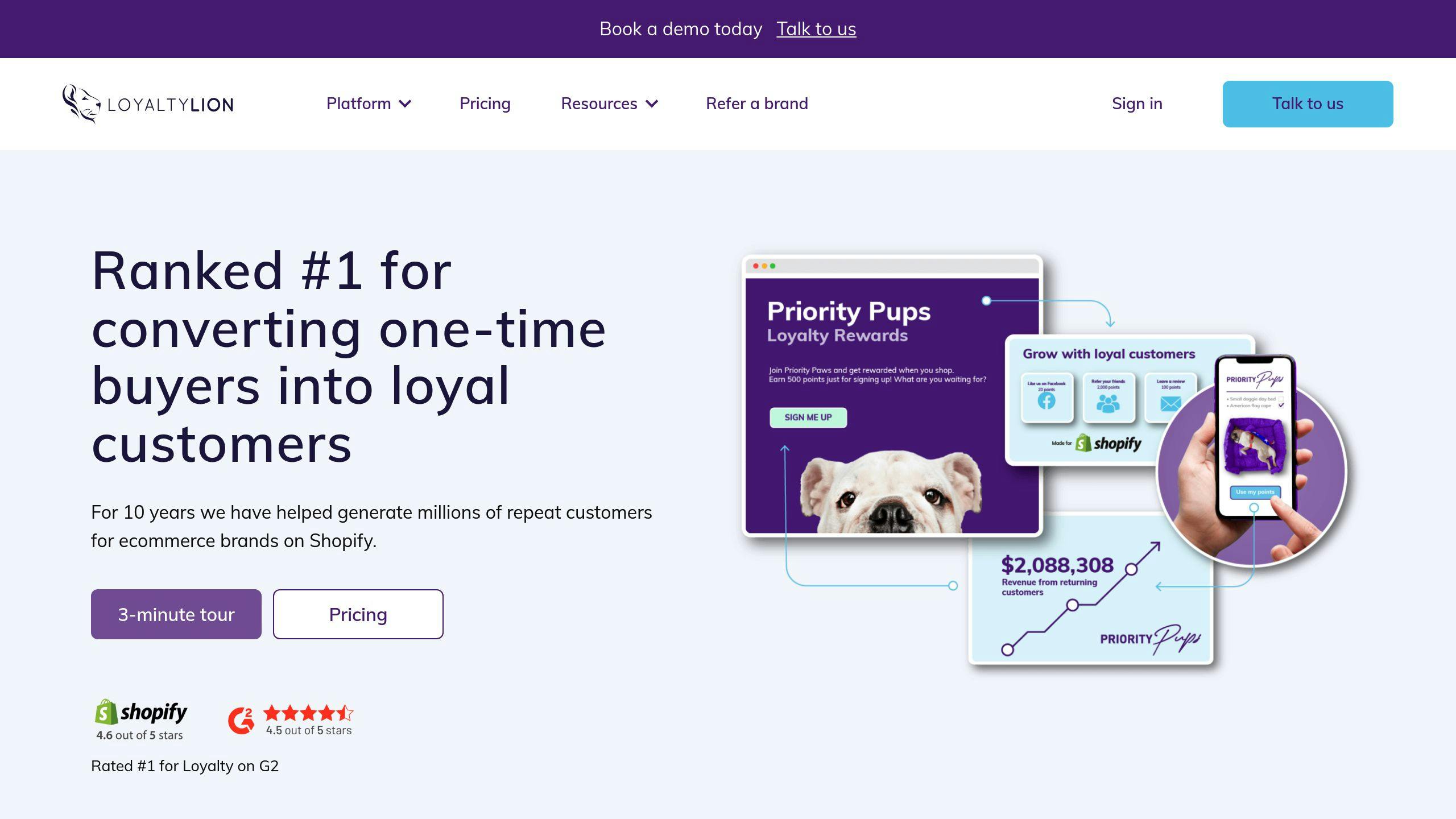
Want to turn casual shoppers into die-hard fans? LoyaltyLion's got your back. This powerhouse helps online stores create loyalty programs that actually move the needle. And it's not just talk - over 5,000 Shopify merchants are already reaping the rewards.
So what's LoyaltyLion's secret sauce? Flexibility. You can dish out points for practically anything - from account creation to social media shoutouts. Plus, it plays well with others, integrating seamlessly with 30+ platforms like Klaviyo and BigCommerce.
Here's a quick look at their plans:
| Plan | Monthly Price | Order Limit | Ideal For |
|---|---|---|---|
| Small Business | $159 | 800 | New stores |
| Classic | $399 | 2,000 | Growing brands |
| Advanced | $699 | 4,000 | Established shops |
But does it actually work? Just ask '100% Pure' - they raked in an extra $244,000 from referrals alone. Or check out 'Pulse Boutique', who saw repeat purchases jump 39% and average order value climb 19%.
"A good loyalty program will be mutually beneficial for your store and its customers." - Andzen Team
Want to kick things up a notch? Set up VIP tiers - LoyaltyLion lets you create up to 4 levels. It's not just a gimmick - 64% of loyalty members spend more to rack up points, and reward-redeeming members buy 2.75 times more often than non-members.
Take a page from REN skincare's playbook: they hand out 20 points just for an Instagram follow. Simple, but effective - especially considering loyalty emails pack 4 times the punch of regular marketing messages.
One feature that really shines? The analytics dashboard. It helps you spot your VIPs and identify customers at risk of ghosting you, so you can focus your efforts where they count. For budget-conscious small businesses, LoyaltyLion's ROI potential is hard to ignore - one apparel brand saw a 321% return in just 3 months.
Getting Started with These Tools
Let's dive into how you can use these tools to boost your marketing funnel without breaking the bank or overwhelming your team.
First, look at your current marketing efforts and budget. Most small businesses spend about 13-15% of their revenue on marketing. If you're making $25 million or less, marketing might take up about 53% of your overall budget.
Here's a smart way to split your marketing money:
| Budget Allocation | Percentage | Focus Area |
|---|---|---|
| Brand Awareness | 10-20% | Top of funnel activities |
| Lead Nurturing | 10-20% | Middle funnel engagement |
| Direct Response | 60-80% | Bottom funnel conversion |
Before you jump in, think about where your business is at. As Josh Brisco from CPC Strategy says:
"Building a digital marketing budget to grow your business becomes much easier once you've identified your marketing priorities."
New startups should focus on getting their name out there, while established businesses can work on turning interest into sales.
Start small. Try free trials and basic plans. HubSpot's free CRM and Mailchimp's starter plan (up to 1,000 monthly sends) let you test things out without spending a dime. When you're ready to go bigger, look at professional plans - HubSpot Marketing Hub starts at $800/month, while ActiveCampaign begins at $29/month.
The results can be big. Companies that are great at lead nurturing get 50% more sales-ready leads while spending 33% less. Plus, marketing automation helps sales teams spend 22% more time actually selling, and Gartner says it can cut creative production costs by 15%.
To make things run smoothly, pick tools that are easy to use and work well with what you already have. Train your team well - create experts who can help others and set up regular training sessions. And don't forget to track how you're doing: 78% of top marketers say marketing automation has helped them make more money.
Ruthie Okere puts it well:
"You don't want to spend ages trying to figure things out, especially if you're no tech whiz. So, opt for easy-to-use tools and make sure they play nice with the other tools you're already using."
Keep checking if your tools are helping you reach your goals. If something's not working, don't be afraid to change it up. With the right approach, these tools can turn your marketing funnel into a money-making machine.
Conclusion
Marketing funnel tools can supercharge your small business's growth. Most websites only convert 1-2% of visitors, so picking the right tools is key to boosting those numbers.
The marketing world is moving away from simple linear funnels. Now, it's all about the "flywheel" model - keeping customers engaged long-term, not just making one-time sales. That's why tools like HubSpot and ActiveCampaign are so useful for building lasting customer relationships.
"Even though the sales funnel's days might be numbered, sales funnel software isn't going anywhere."
The numbers don't lie. Businesses that use these tools well see big results. Take LinkedIn Sales Navigator - companies using it report deal sizes up to 42% larger. And when you pair these tools with a good CRM, you get a crystal-clear view of customer behavior and sales performance.
Success boils down to picking tools that fit your business and budget. You might start with Systeme.io's free plan or go all-in with HubSpot's full package. The key is choosing tools that give you clear metrics and insights you can act on.
For context, U.S. businesses with solid email marketing see open rates between 19.7% and 30.9%, and click rates from 3.6% to 5.4%. Use these numbers as a benchmark when you're setting up your tools.
"By understanding the marketing funnel and the unique challenges and opportunities at each stage, you can tailor your marketing accordingly and maximize your chances of success", notes Ruthie Okere.
